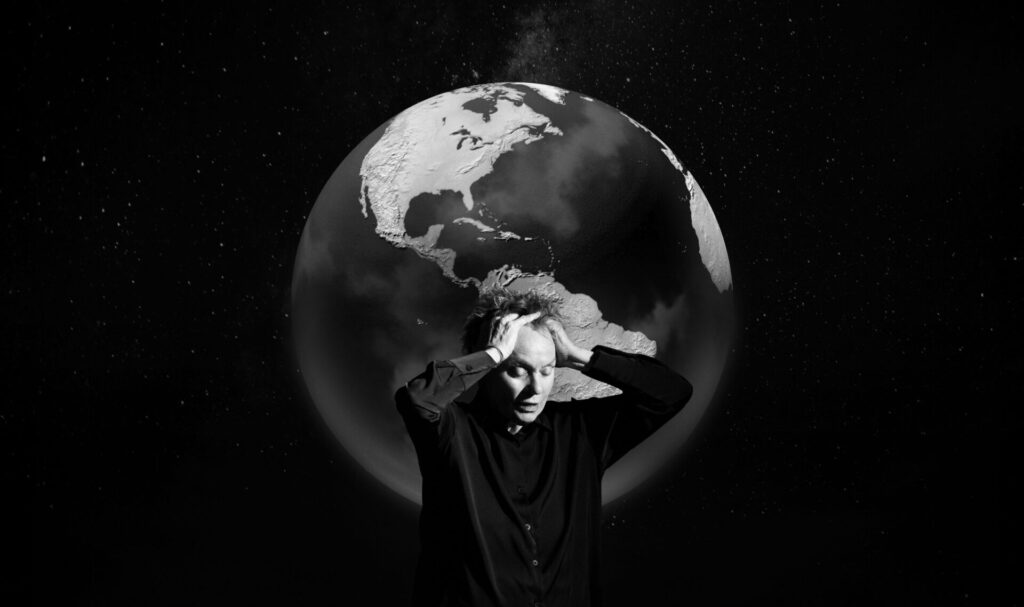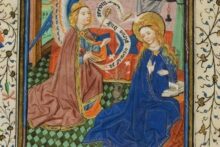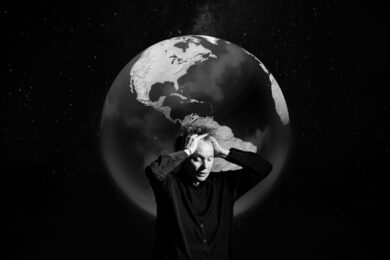On 3 February 1983, Laurie Anderson unveiled her four part multimedia show United States at the Brooklyn Academy Of Music. Some attendees may have expected a more conventional concert, following her unlikely rise to pop stardom with 1982 debut album Big Science and its single ‘O Superman (For Massenet)’: an eight-minute-long, chiefly acapella piece about the American military industrial complex, which had become an international hit.
What they saw was an eight-hour performance (split across two nights) combining spoken-word, film and photography, between visions of what music could be on – as Reagan had declared it in his recent State Of The Union address – “the frontier of high technology.” It featured electronic vocal manipulation, strange instruments of Anderson’s own creation (including a violin rigged to play an audiotape), and equally strange uses of familiar technology: for the piece ‘Small Voice,’ she used her lips to manipulate a recording of a violin played from a speaker inside her mouth. This was a grand, ambitious project with a grand, ambitious subject: America, and its place in an uncertain technological future.
41 years on, Anderson has now unveiled a fifth instalment at Manchester’s Aviva Studios. ARK: United States V revisits those same ideas of unease about the future, amid the rise of artificial intelligence, the threat of environmental collapse, and the polarising US election. It remains vast in its multimedia scope, but features fresh components spanning AI-generated art and social media – last year, as it happens, ‘O Superman (For Massenet)’ became a viral hit on TikTok. If ARK: United States V raises questions about how unimaginably the world has transformed since 1983, it also invites reflections on how Anderson’s otherworldly music has weathered this change: continuing to explore the future we’re building (or destroying) together.
Anderson started out on the 1970s New York arts scene – rubbing shoulders with Philip Glass, Arthur Russell and William S. Burroughs (all of whom she’d work with) – but was principally a performance artist. Projects included Duets On Ice, in which she stood wearing ice skates embedded into blocks of ice and played a modified violin until they melted. She started a teaching position at New York’s Whitney Museum the same day as B. George, who offered to release her recording ‘Two Songs For Tape Bow Violin: Ethics Is The Esthetics Of The Few-Ture (Lenin) / Song For Juanita’ on his small label One Ten. Shortly after, George released her subsequent single ‘O Superman (For Massenet)’, John Peel invited him to contribute a segment to his Radio 1 show about New York music, and George seized the chance to play it. The song gained traction with other British DJs, reached number two in the UK Singles Chart, and landed Anderson a career-launching deal with Warner. While recording has only formed part of her career since – alongside visual and performance art, documentary-making and voice acting – she has remained a celebrated force in music: covered by the likes of David Bowie (who believed she could read his mind), attracting collaborators ranging from Brian Eno to Arca, and receiving a Lifetime Achievement Grammy Award earlier this year.
Exploring themes of American life in the present and imagined future, her discography begins with the electronically driven debut Big Science (1982), the maximalist United States Live (1984), the more rock-oriented Mister Heartbreak (1984) and her concert film Home Of The Brave (1986). While varied in their musical scope – involving collaborations with artists spanning Burroughs, Peter Gabriel and Nile Rogers – these albums largely centre upon Anderson’s conversational, spoken-word vocal. She moved into more conventional singing style and pop-facing arrangements with Strange Angels (1989) and the Brian Eno co-produced Bright Red (1994) – the latter featuring a duet with Lou Reed, who she would eventually marry in 2008. From there, her albums are marked by longer gaps and more dramatic shifts in style: the more introspective, string-focused Life On A String (2001), the state-of-the-nation epic Homeland (2010), her collaborative album Landfall with Kronos Quartet (2018), and her most recent album Amelia (2024): a song-cycle about aviation pioneer Amelia Earhart.
Throughout these chapters, her twin recurring interests are communication and technology, which overlap in a mainstay of her career: vocal manipulation. Many pieces, stretching through the decades from ‘Say Hello’ in United States Live to ‘Another Day In America’ in Homeland, involve Anderson pitching her voice down to an impossibly deep register. Variously calling this “the voice of authority,” “audio drag” and a character called Fenway Bergamot, Anderson often uses it to provide commentary or converse with herself. When Anderson’s speaker in ‘Say Hello’ asks a gas station attendant for directions, they reply with this deepened voice, turning their unhelpful advice into what feel like cosmic questions and instructions: “You can read the signs. You’ve been on this road before. Do you want to go home?”
The following ten tracks will hopefully serve as useful entry points to Anderson’s impossibly rich catalogue. This is a discography filled with offbeat jokes, penetrating satire, fantastical visions of the future and heart-wrenching realism about the here-and-now. From yearning string pieces to spiky art rock, it is a catalogue teeming with life, always looking – less with unease than excited curiosity – to the future.
‘Two Songs For Tape Bow Violin: Ethics Is The Esthetics Of The Few-Ture (Lenin) / Song For Juanita’ from Airwaves (1977)
Featured on the One Ten compilation Airwaves, these conjoined pieces feature one of Anderson’s many strange inventions: the tape bow violin. Replacing the violin’s bridge with an amplified tape head and the bow’s horsehair with a strip of audio tape, the contact between the two plays the tape. Played like a normal violin, her bow strokes determine the direction, speed and pitch at which the audio plays, recalling (recently invented) turntablism. The song centres on an anecdote in Anderson’s dreamy spoken-word style about being at a Buddhist temple and hearing someone call out for a person called “Juanita”, only to discover they were saying the Buddhist term anattā: “the word for self” she explains (although this contains another twist, as anattā is the idea humans have no fixed ‘self’ at all). Over a bright, chirpy piano arrangement, Anderson uses the tape bow violin to turn the word “Juanita” into the word “no-one.” So much of Anderson’s career is previewed in this strange, rarely heard gem.
‘O Superman (For Massenet)’ from Big Science (1982)
If Anderson seemed like a strange candidate for international pop stardom, it is beyond belief that ‘O Superman (For Massenet)’ is the song that would take her there: a mostly acapella, eight-minute reflection on America’s self-endowed roles as the world’s “Superman,” “Judge”, and “Mom & Dad.” Inspired by the aria ‘Ô Souverain! Ô Juge! Ô Pere!’ from Jules Massenet’s opera Le Cid, her use of a vocoder – technology initially used to disguise voices during the Second World War – was a nod to the military industrial complex. “So hold me Mom, in your long arms, your petrochemical arms, your military arms,” Anderson gently croons in her mechanised voice: unpicking tangled feelings about one’s country as a home, an authority shaping day-to-day life, and a sometimes-destructive player on the world stage. In the context of Big Science’s uncertainties about the digital future, the organic and mechanical maintain an unsteady union: from how the emotion in Anderson’s delivery is flattened by the vocoder, to the analogue synths interrupted by birdsong. It remains her most definitive track.
‘Sharkey’s Day’ from Mister Heartbreak (1984)
Anderson introduces Mister Heartbreak’s shift from the detached, synth-dominated sound of Big Science with a bang. Or, more accurately, a series of bangs: rock drums, shakers, iya, shekere, ikonkolo, whistles and bells fill every inch of the song’s shape-shifting groove. It’s bright, saturated and fizzing with life, from the fuzz-drenched stabs of guitar – courtesy of King Crimson’s Adrian Belew – to Anderson’s burbling synths. The lyrics present the cartoonish world of Sharkey, or ‘Mister Heartbreak’ as “the little girls” call him, who believes that there are messages being relayed to him by his dreams, trees and animals: the character returns for closing track ‘Sharkey’s Night’, featuring William S. Burroughs. It’s a more whimsical picture of the technological future than those given on Big Science, where the sun rises “like a big bald head, poking over the grocery store,” and mechanical trees chop themselves down when they reach full height.
‘Big Science’ from United States Live (1984)
While United States Live is filled with bewildering musical experiments, funny skits and poignant spoken word, the highlight is a version of ‘Big Science’ that outdoes the 1982 studio version. Set over the steady clip-clop of a horse, Anderson speaks as a visitor wandering through a strange place, re-imagining her surroundings even as she surveys them: “I think we should put some mountains here,” she says. “Otherwise, what are all the characters going to fall off of?” This version is thinner and spookier, the synth chords lowered in the mix around that marvellously cinematic clip-clop. This also lends more power to the instrumental break in the middle, which now startles when that big, muscular lead synth arrives, filled out with dramatic, orchestral drum rolls.
‘Beautiful Red Dress’ from Strange Angels (1989)
Set at a bustling bar called ‘The Zig Zag’ – brought to life by background chatter and tinkling glasses – ‘Beautiful Red Dress’ begins as the story of a woman going out by herself after winning the lottery. It soon turns into a barbed reflection on patriarchy, resolving that women need to “save ourselves.” “You know, for every dollar a man makes, a woman makes 63 cents,” Anderson says, noting “fifty years ago that was 62 cents. So, with that kind of luck, it’ll be the year 3,888 before we make a buck.” Strange Angels is more melodic than Anderson’s earlier work, she does more singing in her natural voice (she’d recently decided to take vocal lessons), and the production feels a little more grounded in contemporary pop: the bass tones, synth sounds and funk elements have an air of Prince’s then-recent work to them. However, the changes haven’t come at the expense of Anderson’s personality and wit. “They say women shouldn’t be the President, ‘cause they go crazy from time to time,” she says. “Well, push my button, baby.”
‘Poison’ from Bright Red (1994)
While Bright Red largely continued the pop-leanings of Strange Angels, a standout is the sinister, noirish ‘Poison’. It tells the story of a spurned lover, whose partner moves to a room downstairs with a woman: “I can hear the two of you playing records, moving furniture and fooling around,” Anderson purrs. The “cold, dark wind” blowing through the windows is recreated – over shimmering guitars and deep floor toms – with an airy rumbling sound. These strange sounds were contributed by Brian Eno, who collaborated with Anderson in producing the album and writing this song. As the protagonist is driven to madness, Anderson uses more abstract language for the violent conclusion: “a small bullet, a piece of glass / And your heart just grows around it.” The fact this track followed by a duet with her partner Lou Reed, ‘In Our Sleep’, only gives this revenge-story another deliciously macabre layer.
‘Slip Away’ from Life On A String (2001)
Her first album in seven years, Life On A String saw Anderson strip back the electronics for a sparer, string-led project: including her first violin performances since Big Science. Originally planned to be based on Herman Melville’s Moby-Dick, Life On A String became more focused on personal experiences, and ‘Slip Away’ deals with the passing of her father. Over a haunting arrangement of sustained strings and synths, Anderson gently sings of sitting by his hospital bedside as he passes away. “You told me you had no idea how to die, but I saw the way the light left your eyes.” Anderson has a tremendous gift for realism, and the detail with which she presents small moments in this story – putting a finger to his lips as he sleeps in the hospital and feeling warm air, then later watching him lift his hand and open it as he dies – is heartbreaking.
‘Another Day In America’ from Homeland (2010)
The September 11 attacks took place one month after the release of Life On A String, and over the next several years Anderson’s focus returned to a much-changed United States. Originally developed as a live show, Homeland is an epic, complex album – touching upon foreign policy, religion, medical malpractice and economic collapse – centred around the nearly 12-minute long ‘Another Day In America’. Over cold ambient synths, Anderson delivers a long spoken-word piece in a pitched down voice: described by Anderson sometimes as “the voice of authority,” this voice crystallised in Homeland into her drag character Fenway Bergamot: shown on the album’s cover with a moustache and thick brows. This piece is a grand survey of American life and its detritus: “parking lots, rotten dumps, speedballs, accidents and hesitation, Styrofoam, computer chips.” As Bergamot, Anderson casts an eye over the garbage, closing bank accounts and miserable couples, and finally asks: “how do we begin again?”
‘Everything Is Floating’ from Landfall with Kronos Quartet(2018)
Focused on Anderson’s experiences of Hurricane Sandy in 2012, the third costliest storm in US history, Landfall paired Anderson’s spoken-word with the string arrangements of the Kronos Quartet. Her reflections on the disaster’s significance echo elements of Homeland and United States Live – ‘Nothing Left But Their Names’ sounds like a direct continuation of ‘Another Day In America’ and even re-works some lyrics – but also introduce personal vignettes reminiscent of Life On A String. In album-highlight ‘Everything Is Floating’, Anderson recounts going to her basement after the storm to find the flooding has destroyed beloved keepsakes. “All the things I’d carefully saved all my life – becoming nothing but junk,” she says over the sparse, yearning strings. “And I thought: ‘How beautiful. How magic. And how catastrophic.’”
‘Flying At Night’ from Amelia (2024)
Anderson’s dramatic, orchestrally led latest album Amelia charts the final flight of aviation pioneer Amelia Earhart. In 1937, Earhart attempted to become the first woman to fly around the world, reaching the final leg of her journey before disappearing over the Pacific. Anderson delivers the lyrics from Earhart’s perspective, piecing together the story from her surviving correspondence and flight logs. The real brilliance of the album, however, lies in how Earhart’s accounts occasionally blur with Anderson’s own voice, reflections and memories. Anderson confirmed in an interview with BBC Radio 4 that the childhood story in album-highlight ‘Flying At Night’, about “running across the dark lawn” to watch the planes swoop through the night sky, is from her own childhood rather than Earhart’s: singing dreamily through a vocoder, over an arrangement of plucked double bass and soaring strings. More than a mere biography, these moments turn Amelia into a poignant, moving reflection on what our heroes reveal about ourselves.
Laurie Anderon’s ARK: United States V runs at Factory International in Manchester until 24 November





